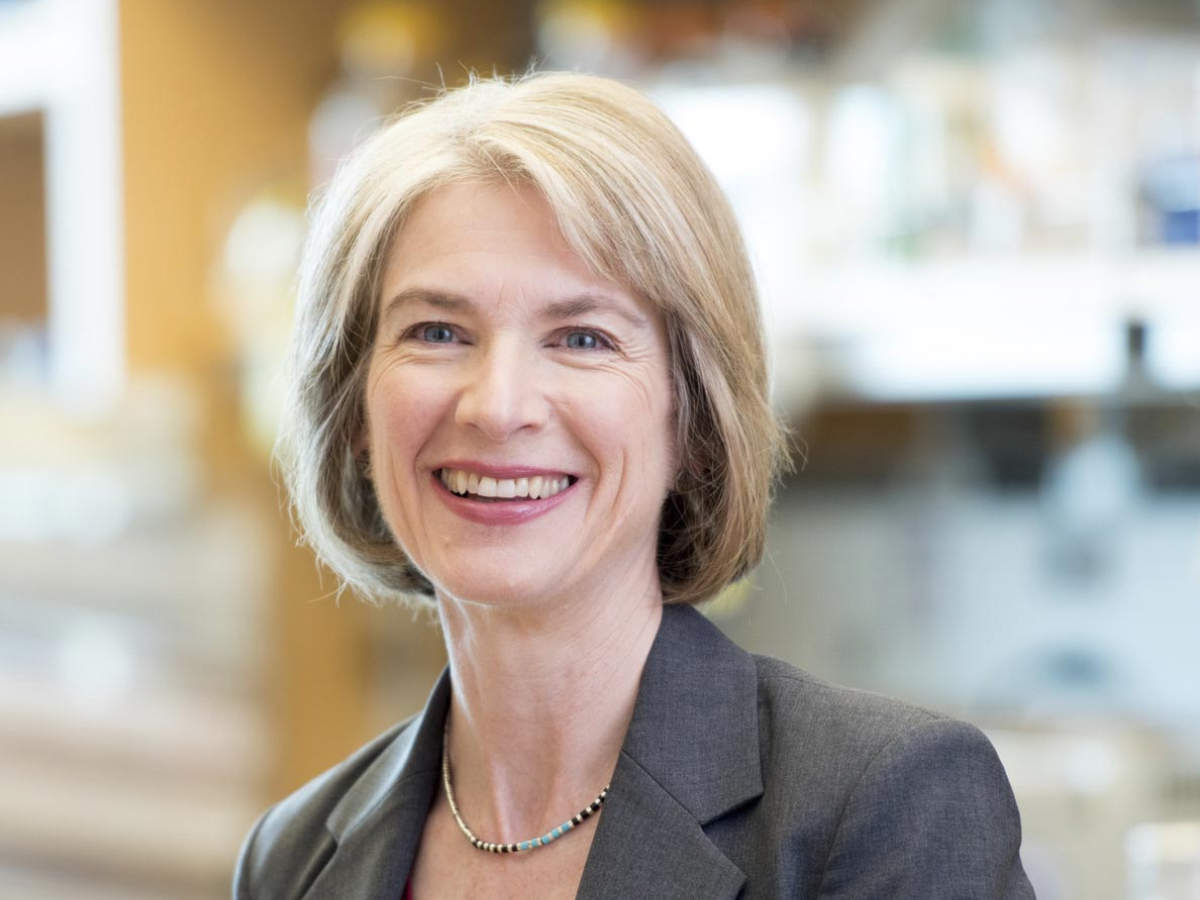this story is from February 27, 2021
‘Genome editing can address multiple genetic conditions — but this must be accessible to all’

Biochemist Jennifer Doudna won the 2020 Nobel Prize in chemistry for her research in gene editing. Doudna, who teaches at the University of California, Berkeley, with her co-winner Emmanuelle Charpentier, discovered ‘clustered regularly interspaced short palindromic repeats’ or ‘CRISPR’ DNA sequences that overthrow DNA from infectious bacteria. Speaking to Srijana Mitra Das at Times Evoke, Doudna discussed this discovery — and what lies ahead:
What drew you to researching genome editing?
When I started investigating CRISPR, I wasn’t studying genome editing at all. A colleague, Dr Jillian Banfield, came to me in 2006 to see if I would be interested in looking into some-thing called ‘CRISPR’— this was an unusual series of repeats that she had been finding in the genomes of bacteria.
It appeared to be a form of immune system, but it wasn’t well understood at the time. It was basic scientific research into how CRISPR functioned in microbes that eventually led to the realisation that it could be harnessed as a tool to precisely cut DNA.

What are some breakthrough inventions in this field which you are looking forward to?
I spend a lot of time now thinking about delivery — how do we get genome editing therapies to the specific cells and tissues that we need to target for different diseases? If you can’t get the genome editing molecules to where they need to go, it’s not going to be an effective therapy, or it could have unwanted effects in other parts of the body. This is a critical area of research, and one with a lot of attention right now, so we’ll be seeing some big advances there in the next few years. It may not sound very exciting at first glance, but when we unlock delivery, it will open the door to new therapies for a long list of unaddressed genetic diseases.
What are the most positive implications of genome editing for human biology?
The vast majority of medical research is directed at a small number of the most common diseases. This means that there are thousands of rare diseases that remain unaddressed, but the people affected by them are just as deserving of our attention. We have amassed a body of knowledge about the underlying causes of many diseases, but these simply aren’t well handled by existing pharmaceutical approaches.
For genetic diseases, or diseases that have some genetic component, genome editing gives us a way to think about these rare ailments more holistically — one core approach could address multiple diseases. I find this prospect extremely exciting.
What are some of the most worrying implications of genome editing for human society?
As with any powerful technology, the concern is always misuse of the technology and we have already seen this with the CRISPR-edited babies in 2018. What gets less attention, but concerns me greatly, is the possibility that some of the advances we make in genome editing will only benefit a small fraction of society. We have seen this inequity happen with new technologies in the past, so it’s very important that we work consciously now to make advances in medicine accessible and affordable to all those who can benefit.
How can such diverse ethical challenges be resolved?
Ethical considerations are contextual, cultural and generational. There aren’t always clear answers — in fact, it’s likely to be an ongoing public debate and a balancing act. In the case of human germline editing, or any of the ethically contentious issues that arise around genome editing applications, there will undoubtedly be a rise in regulations over time around the world. However, they need to be carefully crafted, so that they protect from harm, but don’t stifle innovation at the same time.

As a scientist, what has been the most important learning for you from the Covid-19 episode so far?
It’s hard to see the positives when the pandemic has been such an over-whelming tragedy, but I have really taken to heart how much we can achieve when scientists come together behind a unified goal — there has been so much progress so quickly. At the Innovative Genomics Institute, the research institute I founded at UC Berkeley, we were able to set up a Covid-19 testing lab in a matter of weeks, and have now run over 2,00,000 tests. This would have sounded impossible just a year ago. We have to learn from this moment and carry the spirit of collaboration and shared goals forward to other big challenges facing humanity.

What drew you to researching genome editing?
When I started investigating CRISPR, I wasn’t studying genome editing at all. A colleague, Dr Jillian Banfield, came to me in 2006 to see if I would be interested in looking into some-thing called ‘CRISPR’— this was an unusual series of repeats that she had been finding in the genomes of bacteria.
It appeared to be a form of immune system, but it wasn’t well understood at the time. It was basic scientific research into how CRISPR functioned in microbes that eventually led to the realisation that it could be harnessed as a tool to precisely cut DNA.

What are some breakthrough inventions in this field which you are looking forward to?
I spend a lot of time now thinking about delivery — how do we get genome editing therapies to the specific cells and tissues that we need to target for different diseases? If you can’t get the genome editing molecules to where they need to go, it’s not going to be an effective therapy, or it could have unwanted effects in other parts of the body. This is a critical area of research, and one with a lot of attention right now, so we’ll be seeing some big advances there in the next few years. It may not sound very exciting at first glance, but when we unlock delivery, it will open the door to new therapies for a long list of unaddressed genetic diseases.
What are the most positive implications of genome editing for human biology?
The vast majority of medical research is directed at a small number of the most common diseases. This means that there are thousands of rare diseases that remain unaddressed, but the people affected by them are just as deserving of our attention. We have amassed a body of knowledge about the underlying causes of many diseases, but these simply aren’t well handled by existing pharmaceutical approaches.
For genetic diseases, or diseases that have some genetic component, genome editing gives us a way to think about these rare ailments more holistically — one core approach could address multiple diseases. I find this prospect extremely exciting.
What are some of the most worrying implications of genome editing for human society?
As with any powerful technology, the concern is always misuse of the technology and we have already seen this with the CRISPR-edited babies in 2018. What gets less attention, but concerns me greatly, is the possibility that some of the advances we make in genome editing will only benefit a small fraction of society. We have seen this inequity happen with new technologies in the past, so it’s very important that we work consciously now to make advances in medicine accessible and affordable to all those who can benefit.
How can such diverse ethical challenges be resolved?
Ethical considerations are contextual, cultural and generational. There aren’t always clear answers — in fact, it’s likely to be an ongoing public debate and a balancing act. In the case of human germline editing, or any of the ethically contentious issues that arise around genome editing applications, there will undoubtedly be a rise in regulations over time around the world. However, they need to be carefully crafted, so that they protect from harm, but don’t stifle innovation at the same time.

As a scientist, what has been the most important learning for you from the Covid-19 episode so far?
It’s hard to see the positives when the pandemic has been such an over-whelming tragedy, but I have really taken to heart how much we can achieve when scientists come together behind a unified goal — there has been so much progress so quickly. At the Innovative Genomics Institute, the research institute I founded at UC Berkeley, we were able to set up a Covid-19 testing lab in a matter of weeks, and have now run over 2,00,000 tests. This would have sounded impossible just a year ago. We have to learn from this moment and carry the spirit of collaboration and shared goals forward to other big challenges facing humanity.

Download
The Times of India News App for Latest India News
Subscribe
Start Your Daily Mornings with Times of India Newspaper! Order Now














All Comments ()+^ Back to Top
Refrain from posting comments that are obscene, defamatory or inflammatory, and do not indulge in personal attacks, name calling or inciting hatred against any community. Help us delete comments that do not follow these guidelines by marking them offensive. Let's work together to keep the conversation civil.
HIDE